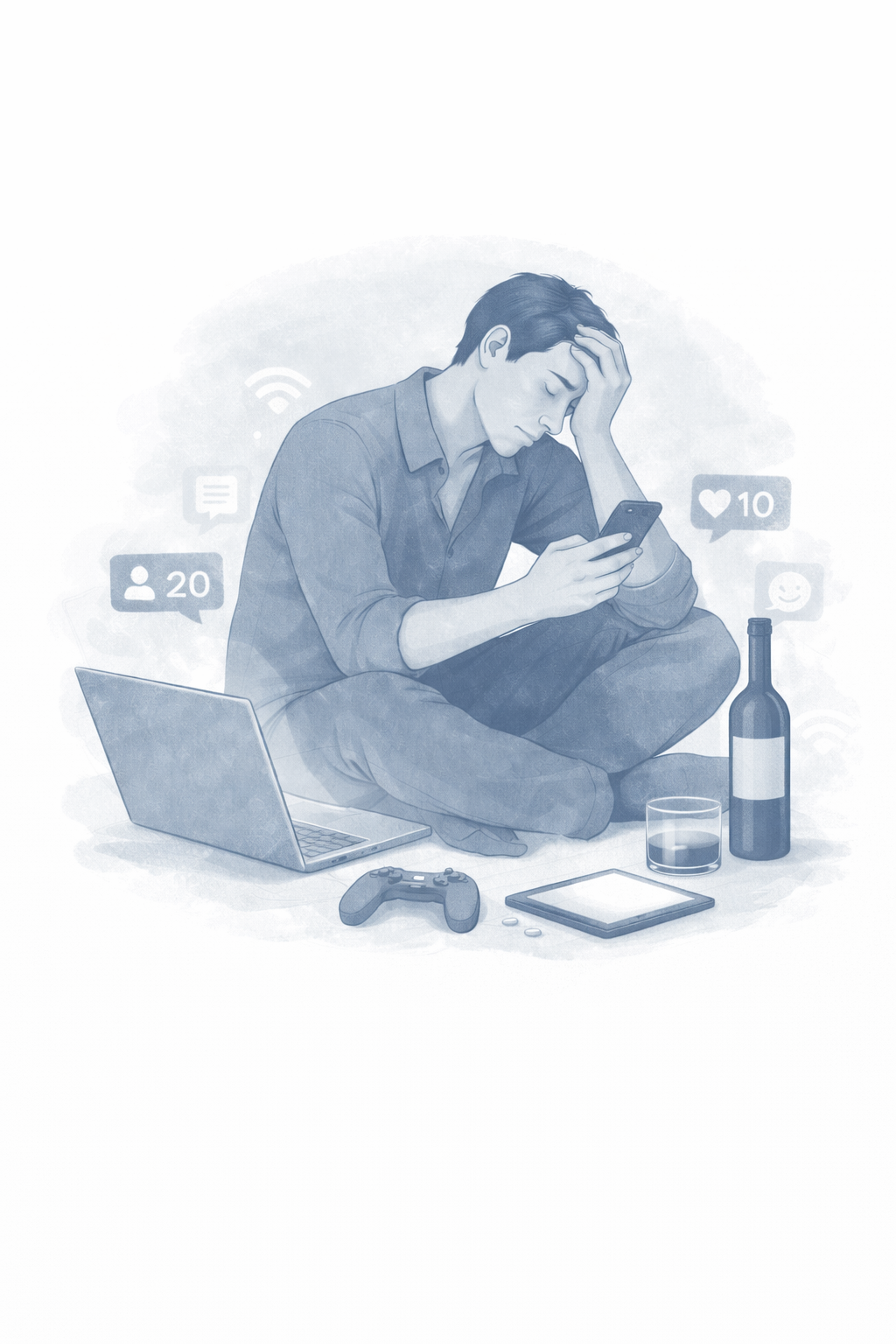Addiction Therapy in Coventry & Online
Find freedom. Heal the root pain. Reclaim your life.
Addiction is not a moral failing. It’s not about weakness or lack of willpower. At its core, addiction is an attempt to soothe pain, regulate overwhelming emotions, or fill an inner emptiness.
Whether it’s alcohol, drugs, food, gambling, shopping, porn, or even overwork — the behaviour is rarely the real problem. It’s the solution that once helped you survive, but now holds you captive.
Addiction isn’t asking: “What’s wrong with me?”
It’s asking: “What happened to me?”
Is Addiction Therapy Right for You?
-
Addiction can take many forms, such as:
Substance use (alcohol, drugs, prescriptions, nicotine)
Compulsive behaviours (gambling, sex, porn, gaming, shopping, eating)
Workaholism or constant busyness
Reliance on technology or social media
Addiction often shows up with patterns like:
Feeling unable to stop, even when you want to
Using to numb stress, loneliness, or past wounds
Shame and secrecy around the behaviour
Relationship or financial difficulties caused by the addiction
Needing more and more to get the same relief
A cycle of guilt, self-blame, and relapse
-
Therapy is not about punishment or control — it’s about healing.
Together, we can:Explore the pain or emptiness that the addiction has been soothing
Reprocess unresolved trauma that fuels the cycle
Build healthier ways to regulate emotions and stress
Develop compassion for yourself, instead of shame
Strengthen resilience, self-worth, and the ability to choose freely
Healing addiction means shifting from “What’s wrong with me?” to “What do I truly need?”
-
My approach is gentle, integrative, and non-judgmental. I tailor therapy to your unique story using:
EMDR Therapy — to safely reprocess trauma and reduce triggers.
Counselling — to create a safe space for honest exploration without shame.
NLP & Coaching tools — to help rewire unhelpful patterns and strengthen healthier coping strategies.
The aim isn’t just to stop a behaviour — it’s to heal the root pain so you no longer need the behaviour in the first place.
-
Case Story 1 – Work Addiction
Ethan (not their real name) prided himself on being the hardest worker in the room. Long nights at the office, emails at midnight, weekends filled with projects. On the surface, he was successful. But beneath it, his health was suffering, relationships were strained, and he felt a constant emptiness when he wasn’t working.
In therapy, we explored how overworking had become a way to avoid deeper feelings of inadequacy. Using counselling and EMDR, Ethan learned to slow down, process the root fears, and begin setting healthier boundaries. Over time, he found balance — achieving in his career without sacrificing his health or connections.
Case Story 2 – Porn Addiction
Jason (not their real name) felt trapped in a cycle of shame. He used pornography to escape loneliness and stress, but afterwards was overwhelmed by guilt and secrecy. It was starting to affect his self-esteem, his relationships, and his ability to connect intimately.
Through therapy, Jason began to understand that the behaviour wasn’t about “lack of willpower” but about soothing unmet emotional needs. Together we worked with EMDR and practical strategies to reduce the compulsion and build healthier coping mechanisms. With time, he reported feeling more present, more confident, and more connected in his relationships.
Case Story 3 – Alcohol Addiction
Sarah (not their real name) turned to alcohol as a way to numb overwhelming stress and trauma. At first, it helped her get through tough days, but gradually it took over — affecting her health, work, and friendships. She felt caught in a cycle she couldn’t break.
In therapy, Sarah began processing the painful memories fueling her drinking, using EMDR to reduce their intensity. We also focused on building resources — grounding tools, support networks, and healthier ways of coping. Slowly, she reduced her dependency and started to reclaim a sense of choice and freedom in her life.
-
Do I need to be “ready to quit” before starting therapy?
Not at all. Therapy can help you explore your relationship with the behaviour at your own pace.Can therapy replace rehab or medical detox?
If you are physically dependent on substances, medical support may be required for safety. Therapy can work alongside medical care to address emotional healing.What if I relapse?
Relapse doesn’t mean failure — it’s information. Therapy helps you learn from it with compassion, not shame. -
Why Work With Me?
I offer a compassionate, shame-free space where your story truly matters. Addiction is not a sign of weakness — it’s often a response to pain, trauma, or unmet needs. Instead of only focusing on “stopping the behaviour,” I work with you to uncover the root causes, heal gently, and build healthier ways to cope.
My integrative approach combines EMDR, counselling, NLP, and coaching — tailored to your unique situation. Together, we’ll focus on reducing the hold of addictive patterns while strengthening your sense of choice, self-worth, and resilience.
Clients often share that this process helps them feel more understood, less burdened by shame, and more hopeful about creating a life that feels free, balanced, and fulfilling.
I also offer a free consultation where we can explore your situation, answer any questions, and see whether addiction therapy feels like the right fit for you.
📞 Book your free call today — and take the first step toward calm, clarity, and lasting change.
Therapies & Approaches I Offer
-

EMDR Therapy
-

Counselling
-

Neuro Linguistic Programming (NLP)
-

Life Coaching

